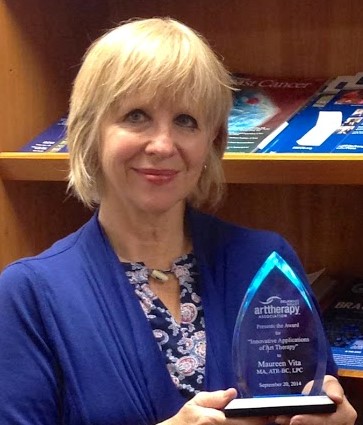CAT Alumni Help Patients Express Themselves When Words Cannot
May 19, 2021
Receiving a cancer diagnosis can be very stressful, and mental health challenges may stay with patients long after treatment. Patients cope with illness, especially cancer, in a variety of ways, but the one thing all people are looking for is support. Thankfully, there are many options. During Mental Health Awareness Month, we are sharing the work of two Drexel University College of Nursing and Health Professions alumni, both creative arts therapists, who worked closely with people facing the long journey through cancer.

Creative arts therapists are board certified and credentialed healthcare professionals who use an expressive process to improve psychological health and general wellbeing. As with other forms of therapy, clients and therapists work toward growth and change, but specific to creative arts therapies, the process taps into the power of art, music, dance-movement, drama and poetry to make meaning, find understanding and develop skills for stress reduction.
 CNHP alumna Maureen Vita, MA ’09, is a board-certified art therapist and licensed professional counselor, and worked as an oncology art therapist at Hahnemann Hospital for over ten years. The patients she worked with responded well to success-based art therapy interventions—something she found very rewarding. Traditional psychotherapy-based art therapy reveals underlying psychological issues, but when used in a medical setting, particularly around cancer, patients develop much-needed coping skills. “It helps reduce pain, and alleviate depression and tension caused by their diagnosis. Art therapy can also help cancer patients cope with intrusive thoughts, for example, that their cancer will return even after they are given a clean bill of health,” Vita suggested.
CNHP alumna Maureen Vita, MA ’09, is a board-certified art therapist and licensed professional counselor, and worked as an oncology art therapist at Hahnemann Hospital for over ten years. The patients she worked with responded well to success-based art therapy interventions—something she found very rewarding. Traditional psychotherapy-based art therapy reveals underlying psychological issues, but when used in a medical setting, particularly around cancer, patients develop much-needed coping skills. “It helps reduce pain, and alleviate depression and tension caused by their diagnosis. Art therapy can also help cancer patients cope with intrusive thoughts, for example, that their cancer will return even after they are given a clean bill of health,” Vita suggested.
Making books, jewelry, origami, masks, collage or even just coloring a mandala were a few of the projects she used in her art therapy practice. “During art therapy sessions, many patients would express their fears, especially about dying knowing that they could not discuss this with their families,” she said. Art therapy with cancer patients can be a powerful tool to help them heal from both the physical and psychological effects of a cancer diagnosis and treatment.
 Music therapy shows similar benefits acknowledged Paul Nolan, MCAT ’82, MT-BC, LPC. An alumnus, adjunct associate professor and retired director of the music therapy program at Drexel University, Nolan offered, “Pain reduction and restoration of the person's mental state and relationships are common outcomes.” He indicated that one of the most powerful transactions in the music therapy relationship is that the patient knows that it is not a medical procedure. This therapy is not used to eradicate the disease directly, but instead works with the person who is undergoing treatment to improve mental and physical symptoms like anxiety, fatigue and diminished quality of life.
Music therapy shows similar benefits acknowledged Paul Nolan, MCAT ’82, MT-BC, LPC. An alumnus, adjunct associate professor and retired director of the music therapy program at Drexel University, Nolan offered, “Pain reduction and restoration of the person's mental state and relationships are common outcomes.” He indicated that one of the most powerful transactions in the music therapy relationship is that the patient knows that it is not a medical procedure. This therapy is not used to eradicate the disease directly, but instead works with the person who is undergoing treatment to improve mental and physical symptoms like anxiety, fatigue and diminished quality of life.
“Like other creative arts therapies, music therapy attracts that which is healthy in the patient,” Nolan described. “These effects seem to re-activate health into the person's awareness and relationships, which helps the person's ego strength in resisting declines in their mental health while also altering the pain experience,” he concluded.
Attending to our mental health is essential in living healthier lives. Creative arts therapies offer meaningful ways to manage worry, trauma, depression and a host of other psychological challenges due to a medical diagnosis. Even if you are not facing an illness, creative arts therapist can help you be more successful in navigating the stress of daily life.
By Roberta S. Perry